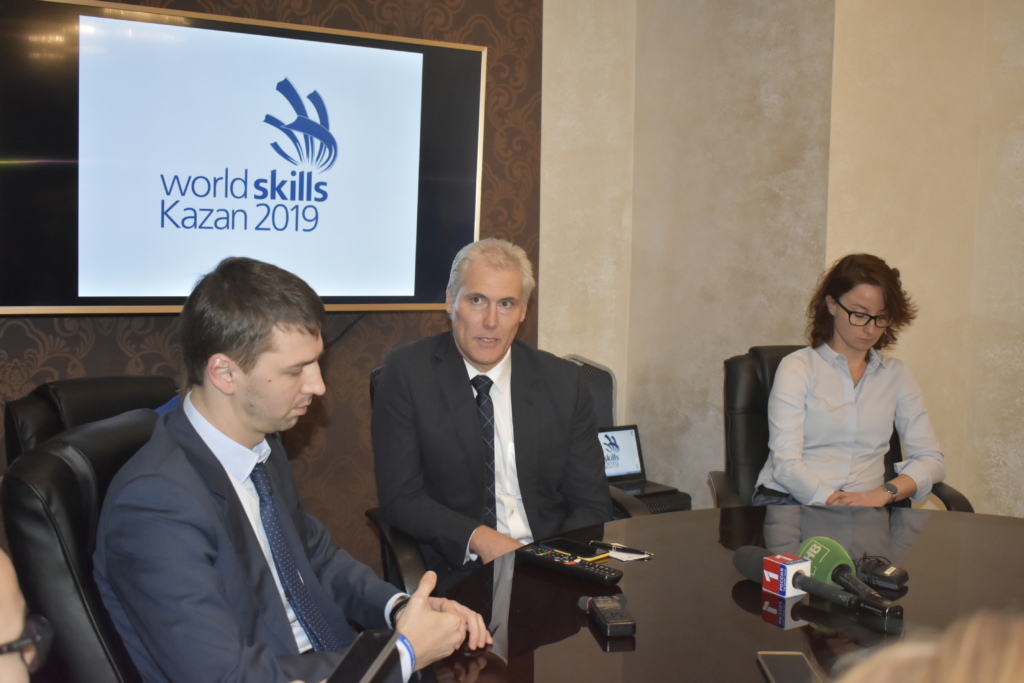Today, one of the key issues of Russia’s education system is the excess of managers with higher education on the one hand, and on the other hand the serious lack of high-skilled workers with vocational education. The situation may change in connection with Russia’s accession to the global WorldSkills movement, aimed at raising the status and standards of professional training and skills throughout the world. CEO of WorldSkills International David Hoey visited Kazan as part of the “From Kazan to Abu Dhabi” WorldSkills debriefing after WorldSkills Abu Dhabi 2017 world vocational skills competition. In an interview with “Gorod A” he speaks about how Russia can use the experience of WorldSkills for the development of vocational education and also shares his opinion on new training mechanisms.
Заметку на русском языке читайте здесь […]
How do you see the Russian legacy for WorldSkills International?
What we look for is that each host country takes a competition works with us. We deliver a world class event that leaves the legacy within the country around its national objectives, but for WorldSkills International global movement moves us for a strategic objectives around the World. So the host has an important contribution back to WorldSkills delivering on those aspects as we drove our organization forward.
What benefits does Russia, especially Kazan, get for organizing this championship?
There are so many benefits for the host country. First conformance, you’ve got core benefits of WorldSkills, which is for Russia to build an economy and for Kazan within Russia to be a strong state in that economy. Here is your industry and your services. All the companies need to grow, to get better and be more competitive. So young people to go into that workforce to deliver work at a higher level to allow you to be competitive is critical. And so we see that all over the world. That young people opt to move into the schools, trades and technologies as a first choice career option. And a lot of parents and people believe that going to university is the best option. Secondly, meeting the demand of industries to move them up. And the third place in that is that it gives you an ability to benchmark. Your education system that is meeting the demand side of skills required against world’s best practice. Because if you are not keeping up with the rest of the world and you don’t know how you are actually comparing to the rest of the world, then you’re out.
In Russia we have an imbalance between people who run a company and employees. So you mean this may help us to restore this balance?
We hope so. Because most owners of companies at one point were specialists of whatever their companies did. We know now because the old schools has been running for many years that young people who choose a career in the schools, trades and technologies were ultimately rising through the ranks to senior positions quicker or become entrepreneurs and start their own business.
I mean that we got a lot of people with higher education and less with…
And again this is one of the things what we’re trying to address with what WorldSkills does. Too many countries have an attitude given predominantly by parents and also by the society that unless you go to university you haven’t succeeded as the white collar worker. What we stand for is that a career in the schools, trades and technologies is a very good, equal first choice option, competitive a white collar position. And we see that a lot of people with degrees around the World are going back to get a school qualification to meet what they need to get jobs, but also to get fulfilling jobs. And so we’re trying to break the paradox of that perception.
What do you think about apprenticeship? It’s common in Germany. People don’t go to colleges, they just go train on-the-job.
And again that is just the delivery mechanism. Germany and most of the German speaking countries around Germany have what we call the dual system. They get their apprenticeship at the company and then they go off the job to the education provider to learn the skills. And in the most of the countries you go straight to the education provider. At the end of the day, the most important relationship is that education, industry and government work together. Because education is irrelevant unless it meets the demand of industry. And so if you are going to make a good connection between industry and the education provider to meet that industry demand, then the system works. The World has many different systems and we often get asked which one is better. It’s really important in our experience to have that rub relationship between them.
David Hoey joined WorldSkills in November 2004 and took the lead in strategic, operational and administrative management. Gradually, he managed to develop WorldSkills International to a unique global movement, which is playing a major role in the popularization and development of vocational skills. David has a Bachelor’s Degree in Engineering, and an MBA. Prior to joining WorldSkills International he has worked as a Project Engineer, Sales Consultant, Technical and Sales Support, Training Consultant and also owner of a consulting company. Initially, David specialized in industrial automation and control technology, but then focused on training, consulting, business development and productivity solutions. He has worked for leading international corporations and also consulted both large enterprises and small businesses.
Interviewed by Timur Galiev

